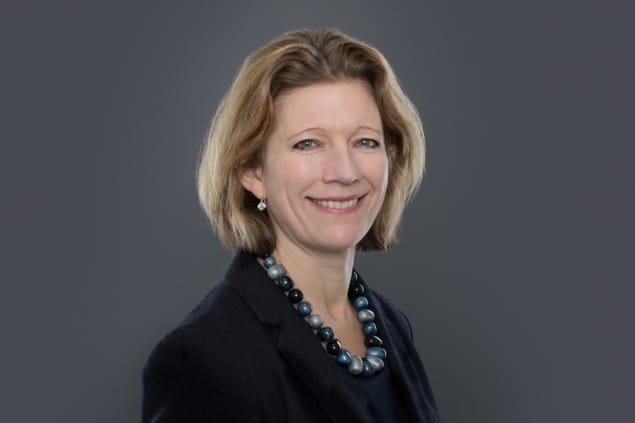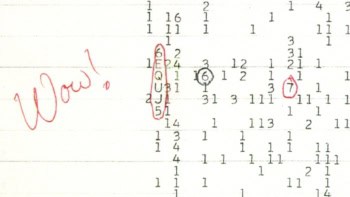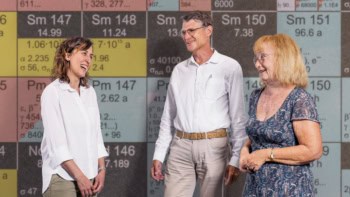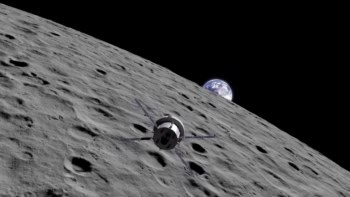Joanna Hart, a physicist and Harwell Space Cluster development manager, talks to Michael Banks about the burgeoning space industry in the UK

What is the Harwell Space Cluster (HSC)?
The HSC comprises 80 organizations and more than 800 people and is the gateway to the UK space sector. Some of the key organizations include RAL Space, part of the UK Science and Technology Facilities Council (STFC), the UK Space Agency, the Satellite Applications Catapult and the European Space Agency (ESA). The HSC provides support to all businesses that want to locate on the campus and/or want to interact closely with the cluster as well as providing access to cutting-edge facilities and business advice.
What is its mission?
The mission is to grow the space industry in the UK and for the HSC to be globally renowned. To do so, we aim to have 5000 people at the HSC by 2030.
What are some of the challenges to meet this?
Recruiting people with the required skill sets is a particular issue. Not only that but also retaining them. The UK has a target of 10% of the global space industry by 2030 and that requires at least 100,000 jobs.
Space is a global industry and UK companies already work with multiple partners across the planet
Joanna Hart
Do you think that is achievable?
The UK currently has around 6.5% of the global space industry, representing £13.7bn in 2014/15 and employing 38,000 people, so we are well on our way. The key to this vision is that we need the continual investment from both government and industry, but if we continue to work together as we have done so far then this should be achievable.
What benefits does space bring for everyday life?
Imagine if you turned off all the satellites orbiting the Earth. So many aspects of our daily lives would suffer. Space now supports so much. Not only that but there are also many spin-out technologies. For example, a spectrometer that has been designed to withstand the harsh environment in space will have numerous applications down on Earth, perhaps in heavy-industry processes.
Why is the UK government interested in the space industry?
The space industry underpins about £250bn of the UK’s gross domestic product and the government sees it as a real growth opportunity. It also has high productivity, in fact, about 2.7 times the national average.
What is driving this growth?
A large proportion of growth is in “downstream” applications or using the data from satellites. For example, Earth-observation satellites can be used to spot illegal fishing or illegal mining.
How will the UK space industry be impacted by the UK leaving the European Union?
It’s too early to say but our membership of ESA is not affected by Brexit. In addition, space is a global industry and UK companies already work with multiple partners across the planet.
What can the UK learn from space sectors in other countries?
Space is a global industry, so many of the companies at the HSC are already collaborating with international organizations, some of which also have a presence at the Harwell campus. The UK has taken a lead in applications using space data. Adding space launch will give the UK the potential to have the full value chain.
What challenges do start-ups face?
The main challenge is getting funding. One important avenue for start-up funding is from ESA’s business incubation centre, which gives firms office space and business advice. Other organizations such as the Satellite Applications Catapult and Innovate UK can also give companies business advice. While funding was a really big challenge in the past, it is getting easier and I see that there is more money coming into the space industry. Many companies at the Harwell Space Cluster have recently had successful fundraisings such as Open Cosmos, Rezatec and Oxford Space Systems.
How did you get involved in the space industry?
I am a particle physicist by training. I did a PhD during which I worked on the ZEUS detector belonging to the HERA accelerator at the DESY lab in Hamburg. I then moved to London working in investment banking. After a career break, I started at the HSC as a development manager.
What excites you most about the industry?
Harwell is such an exciting place to be. When I started almost five years ago, the campus was still in its infancy, but it has grown so much in so little time. When I give talks about the HSC I have to keep updating the aerial image of the campus as it is changing so much every year. For me it is exciting to see companies grow from being initially small to having global ambitions.
What do you think the UK space industry will look like in 2030?
I think the UK space sector will be much broader than it is now with many more services, products and applications from space. The UK is also planning to have its own space port and that will be particularly exciting.



